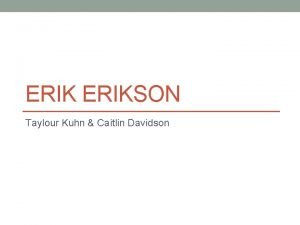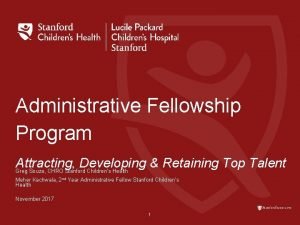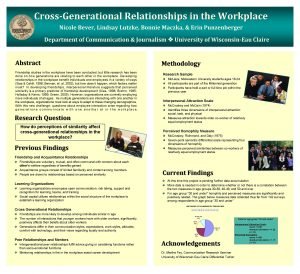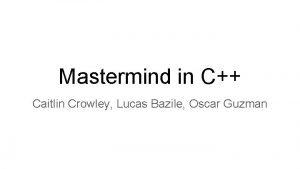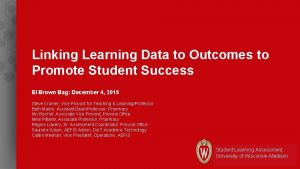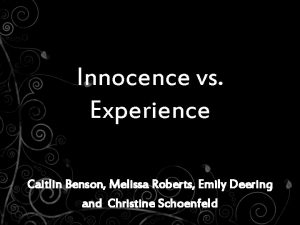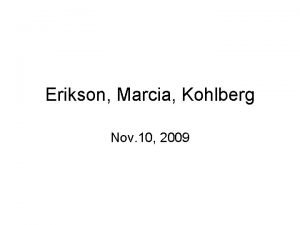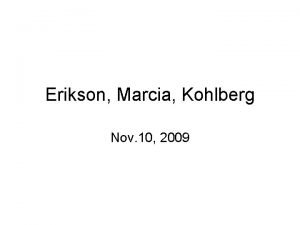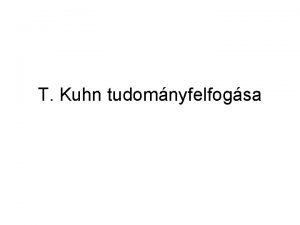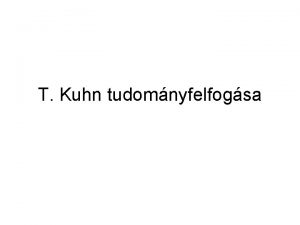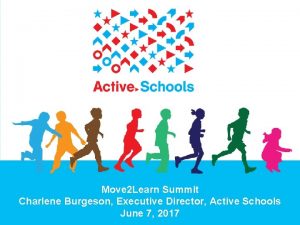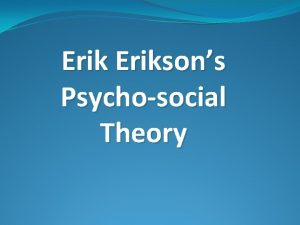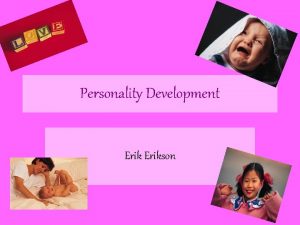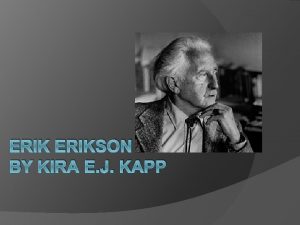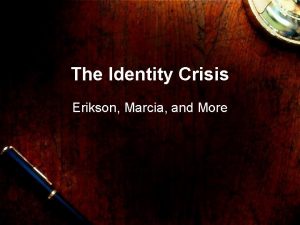ERIKSON Taylour Kuhn Caitlin Davidson Who was Erikson















- Slides: 15

ERIKSON Taylour Kuhn & Caitlin Davidson

Who was Erikson? • German-American • Studied the Montessori Method and Psychosocial theory of personality development • Coined the phrase “identity crisis” • Author of many books on his theories • Agreed with Freud: • Personality develops in stages • Oral, anal, phallic, and latency phases

Education • Did not even have a bachelor's degree • Diploma from the Vienna Psychoanalytic Institute • Studied in Vienna at Burlingham-Rosenfeld School • Met Anna Freud • Taught at many prodigious schools • Harvard • Yale

Family • Spouse: Joan Sersen Erikson (Married 1930 -1994) • Joan helped him develop his psychosocial development theory • 3 children • Kai T. Erikson (son) is a well-known American sociologist.

STAGES OF PSYCHOSOCIAL DEVELOPMENT

Stage 1 - Infancy • Birth to 1 ½ years • Fastest growth period in life • Developmental Tasks • • 1. learn to eat solid food 2. begin to walk 3. begin to talk 4. developing trust • Trust vs. Mistrust

II. Stage 2 - Early Childhood • Ages 2 -3 • • • Developmental tasks 1. walk and talk more 2. potty trained 3. social independence develops 4. Sense of autonomy need to control • Autonomy vs. Shame/Doubt

Stage 3 - Childhood • Ages 4 -5 • Developmental tasks • 1. initiate play • 2. make-believe • 3. asking questions • 4. Begin to learn initiative- ability to start something on their own. • Initiative vs. Guilt

Stage 4 – Late Childhood • Ages 6 -11 • Developmental Tasks • 1. physical skills- sports • 2. intellectually- reading, writing, math • 3. learn right from wrong • 4. develop attitudes towards themselves and others. • 5. develop sense of industry- making things • Industry vs. Inferiority

Stage 5 – Puberty/Adolescence • Ages 9 -17 • • Second fastest period of growth Become capable of reproducing Secondary sex characteristics Hormones develop- estrogen & progesterone/ testosterone • Identity vs. Role Confusion

• Developmental Tasks • 1. Form mature relationships • 2. achieve a masculine or feminine social role • 3. accept one’s physique and use one’s body effectively • 4. Achieve emotional independence from parents and other adults • 5. prepare for marriage and family life • 6. prepare for career • 7. acquire personal standards • 8. develop social intelligence-aware of human needs-helping othersskills

Stage 6 - Young Adulthood • Ages 17 -40 • Independent from parents- Financially and living spaces • Can deal with everyday life trials with maturity • Physical abilities at peak- strength, quickness, alertness • Important life decisions- marriage, career, children • Intimacy vs. Isolation

Stage 7 - Middle Adulthood • Ages 40 -65 Parenthood and work What to do with the rest of their lives Time is running out Death: parents Mid-life crisis - divorce, career change, remarriage 1. some have not accepted middle age- can lead to problems adjusting • 2. Their children may be going through adolescence, during this time which can add to conflict. • • Generativity vs. Stagnation

Stage 8 - Late Adulthood • Ages 65+ • • • Retirement is common Longer life expectancy- 85 Better health practices than in the past. Senior citizen does not equate to old anymore. Measures of Age 1. Chronological- How old you actually are 2. Biological- how well your body is holding up influenced by diet, exercise, lifestyle, genetics 3. Social- what is your lifestyle Grandchildren become important Must face death • Ego Integrity vs. Despair

Books • Wrote a total of 13 books

